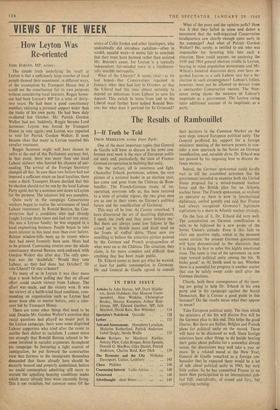VIEWS OF THE WEEK
How Leyton Was Re-oriented
JOIN HARVEY, M P, writes:
The simple truth underlying the result at Leyton is that a sufficiently large number of local people showed their resentment. in different ways, of the assumption by Transport House that it could use the constituency for its own purposes without considering local interests. Reggie Soren- sen had 'been Leyton's MP for a total of thirty- two years. He had been a good constituency member, enjoying a personal support wider than the ranks of his own party. He had been duly re-elected last October. Mr. Patrick Gordon Walker had not. Suddenly, Reggie became Lord Sorensen; Leyton was forced by Transport House to vote again;• and Leyton was expected to vote for Patrick Gordon Walker. It soon became clear that many in Leyton resented this cavalier treatment.
Reggie Sorensen might well have chosen to retire at the end of this Parliament anyway; but, in that event. there was more than one local Labour stalwart who fancied his chances of suc- ceeding. The arrival of the Foreign Secretary changed all that. In case these two factors had not imposed a sufficient strain on local loyalties, there came a third. Transport House decided that this by-election should not be run by the local Labour Party agent, but by a nominee sent down to Leyton for the purpose. The takeover bid was complete.
Quite early in the campaign Conservative workers began to realise the seriousness of local Labour resentment. In Ronald Buxton, the Con- servatives had a candidate who had already fought Leyton three times and had not run away. His was a' Leyton family; he was engaged in a local engineering business. People began to take more interest in this local man than ever before. Buxton window-bills went up in streets where they had never formerly been seen. More had to be printed. Canvassing returns over the whole constituency showed Buxton neck-and-neck with Gordon Walker day after day. The only ques- tion was the `doubtfuls.' Would they vote Labour, as they had done last October? Or vote Liberal? Or stay at home?
To many of us in Leyton it was clear more than a week before polling day that an all-out effort could snatch victory from Labour. The effort was made, and the victory won. It was the victory of a battle-tried local candidate, com- manding an organisation - such as Leyton had never been able to muster before, over a take- over bid by Transport House.
There are some other things that need to be said. Despite Mr. Gordon Walker's assertion that racial questions had played no major part in the Leyton campaign, there were some dispirited Labour supporters who tried after the count to ascribe their defeat to racialism. I cannot stress too strongly that Ronald Buxton refused to be- come involved in racialist arguments throughout his campaign. In favouring a tight control of immigration, he put forward the constructive view that fairness to the immigrants themselves demanded that those already here should be decently housed and properly assimilated, before we could contemplate admitting still more to worsen the appalling housing conditions under which many already here were currently living. This is not racialism, but common sense. Of the
antics of Colin Jordan and other interlopers, who undoubtedly did introduce racialism—often in sordid, squalid ways—it seems fair to conclude that they must have harmed rather than assisted Mr. Buxton's cause, for Leyton is a typically independent, fair-minded town in a fundamen- tally Sensible metropolis.
• What of the Liberals? It seems clear--as we had hoped – that Conservatives regained in January what they had lost in October, so that the Liberal had this time almost certainly to depend on defections from' Labour to save his deposit. This switch in votes from and to the Liberal must further have helped Ronald Bux- ton; but what doe's it portend for Jo Grimond?
What of the press and the opinion polls? How was it that they failed to sense and detect a movement that the well-organised Conservative headquarters saw clearly enough quite early in the campaign? And what of Patrick Gordon Walker? He, surely, is entitled to ask who was responsible for thrusting him into such a situation. How could anyone, on analysing the 1959 and 1964 general election results in Leyton, bearing in mind population movements and Mr. Wilson's hundred disastrous days. ever have re- garded Leyton as a safe Labour seat for a by- election in such circumsjances? Labour's follies, however, must not be allowed to detract from a spectacular Conservative success. The Nun- eaton swing shows the measure of Labour's ineptitude as a government. The Leyton swing takes additional account of its ineptitude as a party.


































 Previous page
Previous page